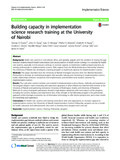Building capacity in implementation science research training at the University of Nairobi

View/
Date
2016-03-08Author
Osanjo, George O.
Oyugi, Julius O.
. Kibwage, Isaac O
Mwanda, Walter O.
Ngugi, Elizabeth N
Otieno, Fredrick C.
Ndege, Wycliffe
Child, Mara
[et.al]
Type
ArticleLanguage
enMetadata
Show full item recordAbstract
Background:
Health care systems in sub-Saharan Africa, and globally, grapple with the problem of closing the gap
between evidence-based health interventions and actual practice in health service settings. It is essential for health
care systems, especially in low-resource settings, to increase capacity to implement evidence-based practices, by
training professionals in implementation science. With support from the Medical Education Partnership Initiative,
the University of Nairobi has developed a training program to build local capacity for implementation science.
Methods:
This paper describes how the University of Nairobi leveraged resources from the Medical Education
Partnership to develop an institutional program that provides training and mentoring in implementation science,
builds relationships between researchers and implementers, and identifies local research priorities for
implementation science.
Results:
The curriculum content includes core material in implementation science theory, methods, and experiences.
The program adopts a team mentoring and supervision approach, in which fellows are matched with mentors at the
University of Nairobi and partnering institutions: University of Washington, Seattle, and University of Maryland,
Baltimore. A survey of program participants showed a high degree satisfaction with most aspects of the program,
including the content, duration, and attachment sites. A key strength of the fellowship program is the partnership
approach, which leverages innovative use of information technology to offer diverse perspectives, and a team model
for mentorship and supervision.
Conclusions:
As health care systems and training institutions seek new approaches to increase capacity in
implementation science, the University of Nairobi Impl
ementation Science Fellowship program can be a model
for health educators and administrators who wish to develop their program and curricula.
URI
http://www.ncbi.nlm.nih.gov/pmc/articles/PMC4782359/pdf/13012_2016_Article_395.pdfhttp://hdl.handle.net/11295/94272
Citation
Osanjo, G. O., Oyugi, J. O., Kibwage, I. O., Mwanda, W. O., Ngugi, E. N., Otieno, F. C., ... & Talib, Z. (2016). Building capacity in implementation science research training at the University of Nairobi. Implementation Science, 11(1), 1.Publisher
Univeraity of Nanirobi
